

A brief history of Waitangi Day. The Treaty of Waitangi is considered New Zealand's founding document, an agreement between the Crown and Maori, the country's indigenous people.
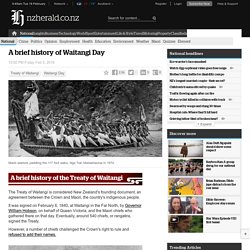
It was signed on February 6, 1840, at Waitangi in the Far North, by Governor William Hobson, on behalf of Queen Victoria, and the Maori chiefs who gathered there on that day. Eventually, around 540 chiefs, or rangatira, signed the Treaty. However, a number of chiefs challenged the Crown's right to rule and refused to add their names. The document itself has three articles, which lay out the principles on which the two groups would form a nation and build a government. It covers sovereignty, land and rights. However, the English and Maori versions do not convey the same meaning. NZ Herald: New Zealand's Latest News, Business, Sport, Weather, Travel, Technology, Entertainment, Politics, Finance, Health, Environment and Science.
John Oliver - New Zealand's New Flag Designs. John Oliver - New Zealand's New Flag. NZ Herald: New Zealand's Latest News, Business, Sport, Weather, Travel, Technology, Entertainment, Politics, Finance, Health, Environment and Science. Malcolm Mulholland: Does our flag reflect who we are as a nation? There is never a right time to discuss changing a national flag - there will always be the need to do more for the poor and announce policies that keep voters content.
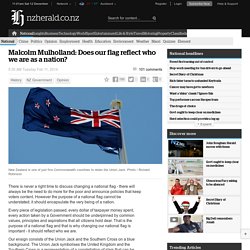
However the purpose of a national flag cannot be understated; it should encapsulate the very being of a nation. Every piece of legislation passed, every dollar of taxpayer money spent, every action taken by a Government should be underpinned by common values, principles and aspirations that all citizens hold dear. That is the purpose of a national flag and that is why changing our national flag is important - it should reflect who we are.
Our ensign consists of the Union Jack and the Southern Cross on a blue background. The Union Jack symbolises the United Kingdom and the Southern Cross is a representation of a constellation of stars that can be seen from any vantage point in the Southern Hemisphere. The design of our flag is attributed to British explorer, author and navy officer, Admiral Sir Albert Hastings Markham. Linguistics - New Zealand English Journal Back Issue - College of Arts - University of Canterbury - New Zealand. Back Issues The New Zealand English Journal was originally published under the title of The New Zealand English Newsletter.
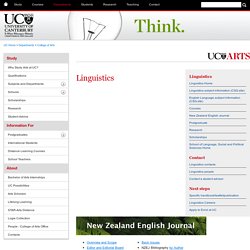
Back copies can be downloaded from this site or obtained as hard copies. Volume 26 (2012) All PDF documents require Acrobat Reader. Top of Page Volume 25 (2011) Volume 24 (2010) Top of Page Volume 23 (2009) Special Issue: The Ian Gordon Fellowship Lectures 2008 Volume 22 (2008) Volume 21 (2007) Volume 20 (2006) Volume 19 (2005) Volume 18 (2004) Volume 17 (2003) Volume 16 (2002) R. A. K. Mason. Ronald Allison Kells Mason (10 January 1905 - 13 July 1971) was described by Allen Curnow as New Zealand's "first wholly original, unmistakably gifted poet".[1][2] He was born in Penrose, Auckland on 10 January 1905.[3] [4] He was educated at Auckland Grammar School, where he met fellow poet A.
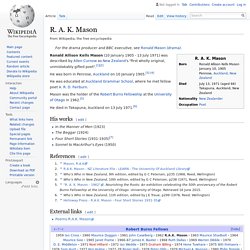
R. D. Fairburn. Mason was the holder of the Robert Burns Fellowship at the University of Otago in 1962.[5] He died in Takapuna, Auckland on 13 July 1971.[6] His works[edit] In the Manner of Men (1923)The Beggar (1924)Four Short Stories (1931-1935)[7]Sonnet to MacArthur's Eyes (1950) References[edit] Jump up ^ Mason, R.A.KJump up ^ R.A.K. External links[edit] History. A quick, easy summary Read the Full Story Māori settlement The Māori people are Polynesians.
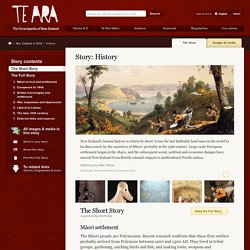
Recent research confirms that these first settlers probably arrived from Polynesia between 1200 and 1300 AD. They lived in tribal groups, gardening, catching birds and fish, and making tools, weapons and ornaments. Do you speak Kiwinglish? New Zealand's distinct linguistic identity. Enough about the “British style” and the “American way” already.
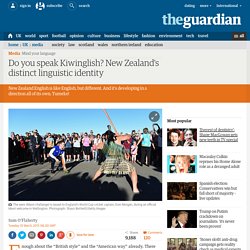
There are other nations speaking English out there. It is the official language in 58 sovereign states and recognised, if not spoken, almost everywhere else. One such place is New Zealand, where we speak a special language. Let’s call it Kiwinglish. In the UK it’s arse, in the USA it’s ass. To put it into perspective, the Maori language was actively suppressed for many years after colonisation. The Maori language is evident in more than just spoken, colloquial language. The development of Kiwi in this direction is tumeke! This uptake of indigenous words and phrases, although significant, is not the only thing that’s helping to transform modern Kiwi; it’s also the way that traditionally British words have changed meaning on their journey down under. So, is NZ English easy for native Englanders to understand? Oh, and watch out for irony.
Take sheep for example.